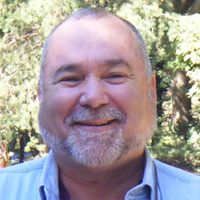
As part of this endeavor, a new annual conference is planned that will focus on M4IS2/OSE, and in passing, redefine both political science and the craft of intelligence as we go forward together.
DOC (5 Pages): 2014-04-23 (3.8) PhD Research Proposal Robert David Steele
2014 Research Proposal – Political Science
Multi-Disciplinary Evidence-Based Sustainable Hybrid Public Governance Norms & Methods
Introduction
Political Science is the study of governance, and has up to this point been largely a passive observer of the process. Despite the enormous foresight of some individual political scientists – Richard Falk and Edgar Morin come to mind – Political Science as a discipline (an element of the humanities) has been slow to recognize emerging threats, challenges, and processes of change at the same time that the Sciences have advanced in often dangerous directions with great costs to society and the Earth. Political Science has done little to help the public understand, mobilize, and engage.
Below I summarize the context as I have derived it from reading in 98 categories of non-fiction:
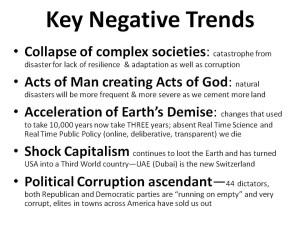
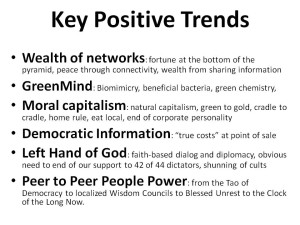
Below are illustrated the present state of the scientific disciplines – the humanities are in worse shape – and my preliminary design for a new integrative approach to governance and understanding.
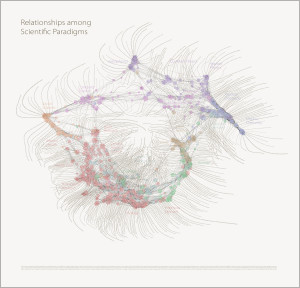
The above diagram is from Dick Klavans, founder of Maps of Science.
It is based on comprehensive citation analysis across all disciplines.
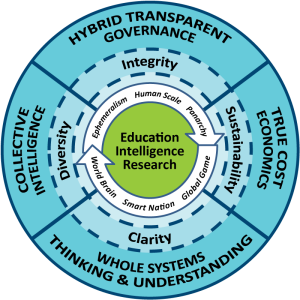
In my view, the time has come for Political Science to become a normative discipline that is the proponent for both Multinational, Multiagency, Multidisciplinary, Multidomain Information-Sharing and Sense-Making (the human solution) and the adoption of Open Source Everything (the technical solution).
This PhD research proposal is tentatively centered on technopolitics or digital activism, striving to study, design, test, and then promulgate a theory and practice of grassroots multi-stakeholder decision-support and decision-making (two completely different processes). The intent is to be relevant to the five billion poor (i.e. affordable and accessible to the five billion poor) and combine complete access to all relevant information including true cost economic information, with near-real-time geospatial visualization and other open source information technology tools for thinking. My starting point is Robert David Steele, “The Evolving Craft of Intelligence,” in Robert Dover, Michael Goodman, and Claudia Hillebrand (eds.). Routledge Companion to Intelligence Studies (Oxford, UK: Routledge, 2013).
Three “what if” questions are proposed for inquiry rooted in a case study to be determined.
WHAT IF Political Science were to make the evolving craft of intelligence (decision-support) its central focus, such that a new norm is established in which politics is evaluated in relation to its ability to engage in deep multi-cultural history and holistic analytics that are public in nature and inclusive of all eight tribes of public hybrid governance (academic, civil society, commerce, government, law enforcement, media, military, non-government/non-profit)?
WHAT IF Political Science enhanced its scientific credential by embracing Whole Systems True Cost Economics as a foundational multi-disciplinary science with data indexed geospatially and in time? This would create a more grounded landscape of financial, social, and ecological opportunity and threat — a basis for being a normative discipline.
WHAT IF Political Science recognized that in the Age of Information no discipline can be credible without the ability to collect, process, analyze, and share information affordably, inter-operably, and universally, which is to say, in an Open Source Everything fashion? This restores agency to the public – we put the public back into politics, but this time we connect all minds with all information in all languages.
Research Theme and Problem
The research will investigate existing attempts to govern outside the industrial-era state-dominated government model, with particular attention to human cognition and behavior as influenced by information protocols and technologies and access to ethical evidence-based decision-support. Rooted in indigenous forms of bottom-up governance, the project will investigate collective intelligence instances, identify successes and failures, and then design, test, and document an affordable, inter-operable, and scalable form of hybrid public governance in which no element controls the whole.
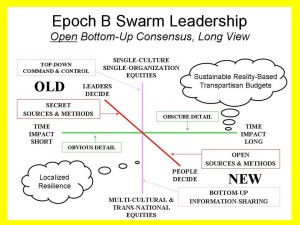
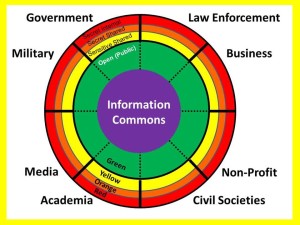
This will, among other things, call for direct contact with collaborators in each of what I have for decades called the eight tribes of information: academic, civil society, commerce, government, law enforcement, media, military, and non-government/non-profit. What might work as a model to be tested is an open system of information-sharing and sense-making in which representatives of each information tribe work with the same rich information environment. With appropriate facilitation through a ‘neutral' party, information-sharing and sense-making exercises are expected to produce superior intelligence, judged from the perspective of all, compared to similar work produced by each tribe individually. The definition of “superior” is of course a matter of contention. That criterion is itself submitted to the group in a second-order cyber-reflexive loop that indirectly promotes cohesion and mutual discipline, advancing local information-sharing.
Method/Research Design
From 2006-2008 I funded a number of experienced volunteers in creating the Earth Intelligence Network, an accredited 501c3 (non-profit) in the USA. At this time it has no employees and no budget. What it does have is a starting point for testing both a holistic analytic model for hybrid public governance; and an open source true cost economics network for collecting, processing, and presenting public intelligence (decision-support) in the public interest.
At its simplest level, we must recognize that major governments do not focus on the top three high-level threats to humanity (poverty, infectious disease, and environmental degradation), in part because their military-industrial-intelligence complexes profit from war, and in part because industrial era corporate complexes strive to protect their legacy investments against faster, better, cheaper alternatives. At the same time, the various policy communities have been captured by the recipients of tax revenue rather than the tax payers themselves – in the USA the Cabinet Secretaries fight to protect budget share and mega-stakeholders (those who receive revenue), rather than apply ethical evidence-based decision-support on behalf of their citizen stakeholders (those who provide the revenue).
What appears to have collapsed as a decision-making model is the Weberian bureaucratic hierarchy that seeks to control information and that makes decisions based on narrow managerial privileges, the abuse of secrecy, and various forms of corruption including data corruption, rather than open discussion of all possibilities, proper investigation of true costs, and broad discussion of alternative courses of action.
There have been past innovations that showed great promise but were marginalized. The industrial input-output grid, attempts to foster an appreciation for ecological economics, even measures of national happiness and “intangible” wealth, are examples. Many good possibilities are emergent.
This research proposal seeks to test and document the idea that bottom-up public education and public access to information-sharing and sense-making or intelligence/decision-support tools, will lead to decisions at all levels of governance that are superior to anything the government can decide on its own. The proposal hypothesizes that these decisions will be sustainable through transparency and efficacy, and that the government will quickly see that agricultural and energy revenue, and donor investments, increase in this context of public collective governance on the basis of full shared access to information.
The research proposal also envisions a demonstration of improved information creation and sharing, in that each citizen, each stakeholder, will be empowered to share, and incentivized to share, information that will be made more valuable by being shared than by being restricted.
Information Technology Facilitation
By virtue of being centered on Open Source Everything as the nature of the technical architecture, this project offers both the high-value prospect of harvesting all that is emergent from open source projects (for example Crisis Mappers The Humanitarian Technology Network); and also a reasonable prospect of being relevant and influential in inspiring other new endeavors bringing open technologies to bear.
Sophisticated graphics and additional information are available. In this short proposal I only suggest that a preliminary open source ecology is available for information-sharing and sense-making. OpenBTS, Open Cloud, Open Data, Open Hardware, Open Software, Open Spectrum, Open Standards are among the opens that can be brought to bear. Further work is needed in open source analytics to by-pass the proprietary offerings of companies such as ESRI, and make geospatially-based analytics truly open and effective at the grass-roots as well as the provincial, national, and regional levels.
Preliminary Hypotheses & Thesis Objective
The thesis is intended to demonstrate that in today’s world, if the public can be provided with free information tools and access to all relevant information, everything about politics changes. This is a three-part experiment:
a) create an “application” for decision-support that anyone can use;
b) create a model for assuring that true cost economic metrics are considered within the decision-support application; and
c) leverage existing open source information technology and encourage development of needed new open source information technology applications to empower citizens with tools for thinking, communicating, and mobilizing effectively not just on one issue at a time, but on all issues.
Literature Review
In the English language at a layman’s first look, a few books are relevant on the topic of hybrid governance or governance by network, but all avoid the essential underpinnings of decision-support rooted in whole systems true cost economics or the cultural and technical challenge associated with affordable, inter-operable, scalable local to global information sharing and open collaborative sense-making. I have written the only book in English focused on Open Source Everything. Other smaller literatures exist on true cost economics and various types of open technology, but none focus on the holistic concepts I propose. Neither parastatals nor narrow public-private partnerships encompass the larger human-centric data-driven vision that this project seeks to actualize. I hope to enlist collaborators in a multi-lingual literature review, who later translate the work.
I already have two graduate degrees and also read very broadly. The literature review should be done once the proposal is accepted and under the guidance of a multidisciplinary committee. I propose a three-part approach to the literature review that would be most intense in the first quarter of the first year but be continuous. I also observe that in my experience most published work is five to ten years old – beyond the literature review must come the identification and exploitation of minds that are on the bleeding edge of multidisciplinary innovation, so as to leverage their new work in near-real-time.
Part I: Political Science. Within political science and guided by the committee, I must become current with the latest applicable works in political theory, political economy, policy studies, political communication, political psychology, and political networks. This effort will be synthesized in the first article. This is a political science research endeavor, not a political application of information technology.
Part II: Economics & Information Technology. Within economics I will use citation analytics to examine the latest works in true cost economics and open source information technology as well as the branches of technopolitics and digital activism. This effort will be synthesized in the second article.
Part III: Everything Else Including Physics. My broad reading (over 1,900 non-fiction books reviewed) is a helpful foundation, but from an academic point of view, I see a need for guided exploration across multiple scientific as well as social science disciplines. Physics for example, in now discovering consciousness, and quantum information is a concept worthy of further interest. This is a third article.
Summary reviews of all books will be posted to Amazon, Phi Beta Iota, and the PhD wiki. Summary reviews of all articles, briefings, and interviews will be posted to the PhD wiki. The project will be transparent at all times, and will strive to attract volunteer inputs in multiple languages.
Provisional Chapter Plan
The chapter plan for the book I have been working on, Intelligence with Integrity: Enabling Hybrid Public Governance with Open-Source Decision-Support, is offered as an interim but unsuitable measure. This is completely original work that should be properly scoped out and guided by a committee of masters.
Provisional Project Timetable (Each Year is Twelve Months)
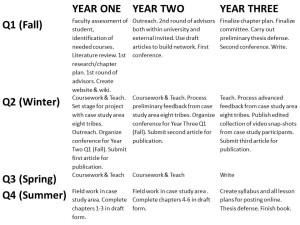
End Game
My end game – over 20 years in the making but requiring the discipline of guided study – is the creation of a School of Future-Oriented Hybrid Governance, and a World Brain Institute, and perhaps also an Open Source Agency that nurtures all the opens. I would seek to do this where I have earned my PhD.
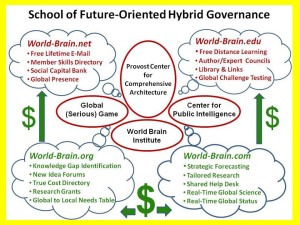
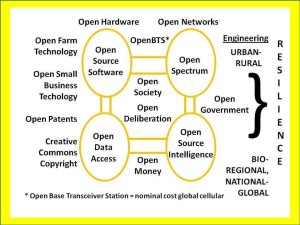
End Game References: 2014 Beyond OSA 2014 Steele's Open Letter 2013 Intelligence Future
A great deal of additional information is available at Phi Beta Iota the Public Intelligence Blog. My proposal is rooted one-third in the work of others up to this point, one-third in my own original work these past 20 years, and one-third yet to be developed as part of a structured PhD program.
See Also:
2014 Beyond OSA
2014 Steele's Open Letter
2013 Intelligence Future
2012 Academy Briefing
1989+ Intelligence Reform
1976+ Intelligence Models 2.1
1957+ Decision Support Story
NATO OSE/M4IS2 2.0
Open Source Manifesto
OSINT Top Guns 1957-2006
Public Intelligence 4.0
Reflections
REVOLUTION
Way of the Truth



